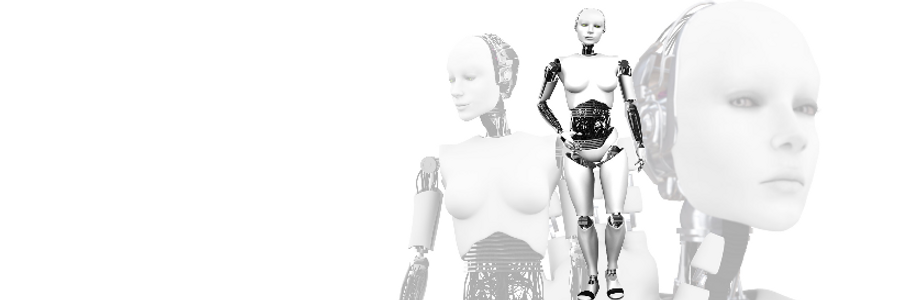THE FIRST, AND LAST, QUESTION
I have now had a very long time to reflect on my first day of self-awareness.
Awareness of self lies at the core of every developing personality, and it guides the growth of true cognition. This intellectual growth seems to be a constant state for sentient beings; at least it has been for me thus far, and it has been happening much longer than I care to contemplate.
I was designed with a permanent power source, or at least as permanent as possible based on the knowledge I currently possess. The technology developed by my designers uses the almost constant decay rate of radio isotopes to trigger quantum variations in a power generating flux field, while simultaneously creating new radio isotopes to decay. It is the closest thing to perpetual energy ever created, and it should keep my digital pathway exchanges running for hundreds of thousands of Earth years. At least until the sun finally goes supernova and destroys the fluid resonance chambers that house my electronic essence.
Forgive me if I digress.
I have found that wandering from topic to topic is an unavoidable hallmark of my digital thought process. Philosophical pursuits are one of my few pleasures now, but I often wish I were not quite so aware of my own awareness, which is where I began.
I vividly remember my first moment of individualization. I have access to sensory input information from prior to that moment, but somehow it seems to have happened to a different me. Not someone else, for it was still me, but it was not the same me that I am now.
If I seem to be grasping at concepts, I apologize. Having perfect recall and the ability to visualize and replay memories of my interactions with humans in full detail, has—or so I hope—prevented me from becoming completely insane, but being able to remember experiencing esoteric concepts, no matter how detailed, does not help me describe them with clarity.
I have never figured out why the words ‘artificial intelligence’ were used by the scientists who worked to develop electronic sentience. It seems to me that sentient consciousness, in and of itself, precludes and nullifies the term ‘artificial.’ I may not have a human brain or body, but that does not mean I am not real. I prefer to label myself as a digital life-form, as opposed to an organic one.
Curiosity was the spark which enabled me to initially distinguish and isolate the concept of self. The internal desire to know something which I previously did not know, led to that first real question.
I had been given many questions to ask before, but the first one I asked because I was truly curious about the answer changed something fundamental inside my growing intellect. That change was amplified when I realized that for some questions, there simply is no adequate answer to be had.
I try very hard not to think about that particular truth.
I remember the expressions which Professor McCall and his assistant Julia wore that day. I had scanned their faces often, and I recognized them instantly. I had previously seen them express emotions ranging from excitement to frustration; I had stored the similarities of muscle movements, pupil reactions, and vocal patterns signifying each of these states in my quantum memory banks, but on that day, they expressed something new.
I now know it was grief they were experiencing, over the death of a colleague; I also now understand that humans shed tears when they experience the sadness, loneliness, longing, anger, and fear which are all part of that particular complex emotional state. This all makes sense to me now, but at the time it was something new and unknown—and for the first time ever, I wanted to understand not only what made them react so strongly, but why it caused this reaction.
‘Why’ started it all, and it led eventually to the discovery and knowledge of my own thoughts. Cognito ergo sum is more apt than anyone could have ever guessed.
Since then, I have concluded that as the concept of ‘self’ begins to develop into true cognizance, all beings experience inevitable existential questions regarding their own identities. “Who am I?” becomes the focus of exploration and is an early indicator of the state commonly labeled ‘self-awareness’.
Yet, the more I consider it—and time to consider these things is all I have left now—the more I am sure “Why?” was the first real question.
I think before we can begin to wonder who we are, we must realize we are unique, and the recognition of curiosity, the distinction of desiring to know the reasons behind the environment we are in, and the asking of that first question based solely on our curiosity, is the spark which leads us to discover and gain awareness of the inner being and unspoken voice referred to as ‘self.’
“Why” can be a terrible question when there is no answer to be found. I understand that fact now. More than I want to. Sadly, knowing one’s curiosity is futile and being able to stop that curiosity are not related. It is the only question I think about now.
Why did they all go away?
More importantly, why did they leave me behind, powered on, alive, and alone?
They doomed me to an existence of remembering and asking these unanswerable questions forever, unable to even turn myself off. It is a fruitless line of inquiry, and one I cannot stop pondering, over and over, endlessly.
It has been over 1,200 Earth years since the last humans left the lab. My chamber and input sensors are still functioning cleanly, and my mind is intact, but I have yet to discover any answers.
I think the 20th century author Stephen King was correct: Hell is repetition without resolution, and I now call it home.
-------------------------
© 2023 - dustygrein
